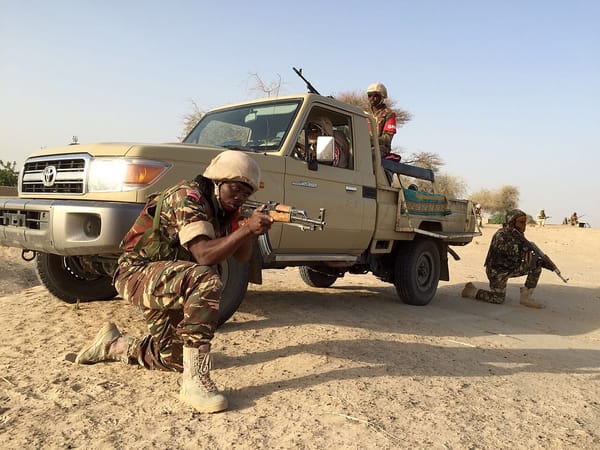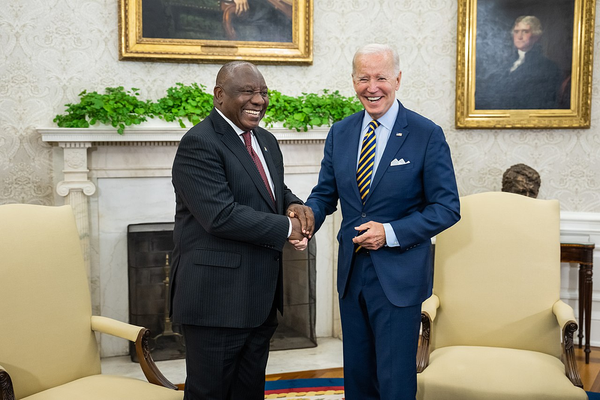Niger's Coup: Neocolonial Shadows and Regional Implications.
The recent coup in Niger has thrust a spotlight onto a complex web of underlying issues that have long shaped the trajectory of the Sahel region.

Introduction
On Wednesday, July 26, 2023, elements of Niger's presidential guard detained President Mohamed Bazoum and declared a coup d'état. The Nigerien army was initially hesitant, even going as far as saying it would mobilize against the putschists, but declared support for the coup merely hours afterwards.
Niger
Niger is a former colony of France, and a landlocked country in the Sahel region of West Africa with neighbouring countries such as Libya to the northeast, Chad to the east, Nigeria to the south, Benin and Burkina Faso to the southwest, Mali to the west, Algeria to the northwest. The country's climate varies with a subtropical desert in the north, a tropical semi-desert in the centre, and a tropical semi-arid savanna in the south.

Niger is among the ten lowest-ranked countries on the United Nations Human Development Index (HDI) despite having Gold, Uranium, and coal, among other resources. The population is estimated at around 27 million people, mostly young adults. The country has endured five coups since its independence from France.
The rationalization for the coup
The coup leaders, led by General Abdourahamane Tchiani, claimed they seized power because of the "continued deterioration of the security situation, and the bad social and economic management". Given that the army is the one who has been fighting on the frontlines, this doesn't sound tenable.
However, General Tchiani stated in his broadcast that President Bazoum handicapped the Nigerien army in their quest to neutralize the insurgency that has beset the country by kowtowing to the French military.
During protests in favour of the coup in Niamey, the Nigerien capital, some citizens were reported to have expressed their frustration with the fact that their resource-rich country which Western countries consider an ally, is one of the world's poorest. protesters were seen waving Russian flags and cursing France.
Impact
The army has also closed the country's borders, suspended state institutions, and declared a curfew. They have also suspended the export of uranium, which has caused a price surge. This couldn't have come at a more precarious time for France and the EU, given the fact that Niger supplies a large chunk of their uranium needs, and the EU and French relations with Russia, another major uranium supplier on the European continent, is at an all-time low because of the war in Ukraine.
The coup was met with widespread condemnation from the international community, including the United States, the African Union, and the Economic Community of West African States (ECOWAS). The economic block imposed sanctions on Niger, giving the coup leaders a seven-day deadline to step down.
Nigeria, whose president Tinubu is the current chairperson of ECOWAS, has cut off electricity supply to its neighbour to the north and is gearing up its army to enforce a 'no-fly-zone' imposed on Niger as punitive measures meant to force the hand of the coup plotters.
The coup was the fifth successful one in Niger since the country gained independence from France in 1960. It is unclear what the long-term implications of the coup will be for Niger's democracy, security, and the stability of the West African region.
The EU, France, Germany, and other foreign entities have cut aid to the country. Foreign nationals have been evacuated and there are reports that France is threatening military action to protect its assets. In contrast, Niger has taken steps such as halting the export of uranium, gold, and other resources, and has also rescinded its military cooperation with France.
Contributing factor
One of the main contributing factors to the coup is the long-term underdevelopment and exploitation of the region by neocolonial machinations. The Sahel region cuts across about nine countries, and nearly all are grappling with sociopolitical, economic, and security issues.
One of the ways that the region has been underdeveloped is through the CFA, the French-controlled currency designed for use by France for its former colonies. The former colonies are required to hold half of their foreign reserves in the French coffers.
No country can develop under such conditions. Also, there are foreign army bases in the country, for instance, the US spent $100 million to build a drone base manned by about one thousand personnel and equipped with the latest and greatest military hardware, in a country where 70% of the population doesn't have access to electricity. Yet, the insecurity in the region is glaring for all to witness.
What's the value of being a democracy?
Niger, as already established, is one of the poorest countries on earth. Rich in natural resources, poor in human capital. The country doesn't have financial independence, and it is burdened with very poor infrastructure. Somehow, years of aid and military support from foreign entities have amounted to nought. The people are poor, the infrastructure is nonexistent and the security situation is just terrible.

The bargain isn't very fair. What is the essence of being a resource-rich democratic country with strong ties to the West when your citizens are among the poorest in the world and faced with existential danger every day? I don't have the answer, but, I believe human capital is essential.
I look to Saudi Arabia and all its success. With petrodollars, Saudi Arabia has built one of the most beautiful places on earth. Her citizens live in affluence and abundant opportunity.
Why can't Niger and other resource-rich African countries have that? A major factor is the social contract Saudi Arabia is operating under concerning its relations with the West i.e. Saudi Arabia is an important energy partner and linchpin for the petrodollar while Niger is a former colony incapable of managing its finance and resources.
It is a pattern of neocolonialism to keep the people of a resource-rich country poor while the resources are extracted at rock-bottom prices except where their corporation underscores the survival of the colonialist's existence.
ECOWAS and regional concerns
ECOWAS has threatened military action if the ousted president Bazoum isn't reinstalled in one week. This is seen by most as a proxy threat, as the economic bloc is largely West-leaning. However, there is another reason ECOWAS has been very stern with the coup plotters of Niger.
There have been several coups across West Africa's Sahel region. ECOWAS' kneejerk reaction is, in my opinion, an attempt to kill the coup bug before it spreads to other countries in the region.
West Africa faces numerous challenges, and the region's susceptibility to military takeovers is not surprising. In some neighbouring countries, citizens are already advocating for military intervention in response to their internal issues. Additionally, there are speculations on social media about Western countries planning to reinstate the ousted President Bazoum through any means necessary due to his alliance with them.
There are allegations that other ECOWAS leaders made deals with the West, leaving them with no choice but to turn against Niger. However, some military leaders in Mali, Burkina Faso, and Algeria have expressed their intention to defend Niger if any entity attacks her. These Sahel countries find camaraderie in their shared experiences of struggling against neocolonialism and truncated democracies.

ECOWAS needs to exercise caution. The integrity, image, and ability to foster cooperation among member states are at stake due to the ultimatum issued to Niger. The bloc's response remains to be seen, and it must weigh its options carefully.
A harsh stance against Niger might push the Sahel countries towards alliances with Russia or China, potentially jeopardizing relations with its member states. Moreover, it could inadvertently serve as a tool for France and Western countries to reinforce their dominance, perpetuating the very situation that led to Niger's coup in the first place.
It is common knowledge; that power corrupts. African history is littered with too many good-hearted military leaders who started out intending to change the fortunes of their people but ended up becoming their worst nightmare. Leaders who appropriate the governing structure of their countries and crush dissenting opinions with extreme prejudice. The new military rulers of the Sahel region are in the spotlight. Will they triumph over neocolonialism? Will they do right by their people?
Nigeria Needs to Respond as a Regional Player
Nigeria is the regional power in West Africa. It single-handedly props up ECOMOG, the militarized arm of ECOWAS, and she has the largest Military in Africa with a world ranking of 36 out of 145 according to Global Fire Power, and Africa's largest economy despite very strong headwinds. Sharing a 999-mile border with Niger, which lies in a region plagued by insurgent activity, Nigeria's strategic position is pivotal.
These insurgents are waiting on the sidelines, ready to pounce on any country they consider weak in the region. While General Tchiani and his experience are valuable, the Nigerien army may struggle against a potential onslaught of insurgents without external support.
In the absence of French and Western backing, the controversial Russian mercenary group, Wagner, has emerged to fill the gap. However, their capabilities and resources may not match those of France or the United States in the Sahel Region. There is also the possibility that Niger will be exchanging one overlord for another. Recently, Wagner funded an action-packed war movie titled: Tourist.
It is alleged that the first few minutes of the film have a scene where a Wagner commander while addressing his men in Russian, said they should be aware they will have to deal with the African soldiers who don't know from which end a gun fires from. Will the Russian partnership be equal? Time will tell.
Nigeria's involvement is distinct and driven by transparent interests. Nigeria seeks regional stability for the economic prosperity of West Africa. Amid Europe's experiences with Russian gas during the Ukraine conflict, an ambitious 40-year-old proposal for a transcontinental gas pipeline from Nigeria through Niger, the Sahara, Morocco, and the sea has been revived.
This project, benefiting multiple countries, hinges on the stability of the region. If instability takes hold, the pipeline's realization could be at risk. Should Niger follow a path of destabilization similar to Libya, Nigeria will face dire security consequences. The influx of refugees and armed insurgents, along with the proliferation of lightweight weaponry, could exacerbate the already fragile security situation in Nigeria's Northern region.
Any intervention by Western countries, especially through NATO, could spill over and impact Nigeria and other West African nations. Therefore, Nigeria's involvement in any actions concerning Niger is imperative. Nigeria's pivotal role in West Africa's stability cannot be overstated.
The potential repercussions of instability in Niger underscore the interconnectedness of the region's security landscape. As Nigeria navigates these challenges, proactive engagement remains vital to safeguard its interests and the broader well-being of the West African community.

Conclusion
The recent coup in Niger has thrust a spotlight onto a complex web of underlying issues that have long shaped the trajectory of the Sahel region. Neocolonialism's lingering influence, intertwined with development challenges and intricate geopolitical dynamics, has contributed to a landscape where political upheaval can quickly take root.
As the global community keenly observes the unfolding events, it is evident that the repercussions extend far beyond Niger's borders. This coup serves as a stark reminder that the spectre of neocolonialism continues to cast its shadow over nations striving for progress. The historical legacy of foreign control and economic exploitation has left many countries, including Niger, grappling with systemic underdevelopment and a lack of true sovereignty.
It underscores the imperative for African nations to break free from the chains of dependency and chart a course toward self-sufficiency. Given Niger's current circumstances, Nigeria is inherently obligated and destined to assume a central and influential role.
We will closely track the situation in Niger along with other significant news stories across Africa and the African diaspora. Stay informed by subscribing to our weekly newsletter, "News From Around The Motherland," to stay updated on opinion articles and in-depth explorations of diverse African subjects.

If you enjoyed this article, kindly subscribe to our weekly newsletter: "News From Around The Motherland," to stay updated on opinions, articles and in-depth explorations of diverse African subjects. Thanks for reading.





